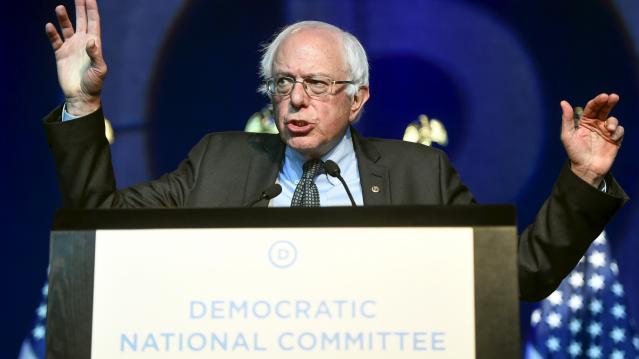Sanders Pulls Ahead in Iowa, but a Tougher Clinton Aims to Even the Score

A new poll unveiled Thursday finds populist Bernie Sanders squeezing past Hillary Clinton for the first time as the preferred choice among likely Iowa caucus-goers.
The survey by Quinnipiac University shows the Vermont lawmaker receiving 41 percent, while Clinton garnered 40 percent. The figures put Sanders’ lead well within the poll’s 3.4 percent margin of error, but the numbers serve as another indication of how tight the Democratic primary has become, especially in Iowa where Clinton has long maintained an advantage.
Related: With Trump and Sanders Riding High, How Low Will Bush and Clinton Go?
The poll found another 12 percent of voters would support Vice President Joe Biden, who has yet to decide if he will enter the 2016 race. Former Maryland Governor Martin O’Malley received 3 percent, and the same number were undecided.
While many could view the survey as the latest sign Clinton’s campaign is flailing, the timing of the poll could prove crucial.
The study was conducted between August 27 and September 8. That was the same day the former secretary of State told ABC News that using a personal email account while in office was a mistake and that she is sorry for it.
Related: Hillary’s E-Mail Lapse ... Mistake ... Responsibility ... er, 'Apology'
“I do think I could have and should have done a better job answering questions earlier. I really didn’t perhaps appreciate the need to do that,” Clinton said. “What I had done was allowed, it was above board. But in retrospect, as I look back at it now, even though it was allowed, I should have used two accounts. One for personal, one for work-related emails. That was a mistake. I’m sorry about that. I take responsibility.”
The interview marked the first time she apologized for her unique email arrangement. Questions over Clinton’s use of a private server have dogged her candidacy since she entered the White House race earlier this year.
Republicans have used the controversy surrounding the server to paint Clinton as untrustworthy and unfit to serve in the White House.
Related: Clinton: Trump Is Bad for American Politics
Indeed, Thursday’s poll found that while Clinton is still liked among Democratic voters who believe she would make a good leader, Sanders fares better on the question of trustworthiness.
The Quinnipiac poll also closed before Clinton gave a muscular foreign policy speech at the Brookings Institution on, among other things, the Iran nuclear deal.
“We should anticipate that Iran will test the next president,” she said. “They'll want to see how far they can bend the rules.”
“That won't work if I'm in the White House. I'll hold the line against Iranian noncompliance,” Clinton added.
On the softer side of things, Clinton’s interview on “The Ellen DeGeneres Show” will air Thursday afternoon. The appearance will give her a chance to connect with female voters who are the backbone of her support.
Taken together, the various actions could put Clinton back atop the polls, at least in Iowa, and help her gain back ground she lost to Sanders in New Hampshire as well.
Top Reads From The Fiscal Times:
- House GOP Scores a Major Win in Obamacare Legal Challenge
- Hillary’s E-Mail Lapse ... Mistake ... Responsibility ... er, 'Apology'
- How Can You Tell There Are Russian Troops in Syria? Just Look for Some Soldier Selfies
Budget ‘Chaos’ Threatens Army Reset: Retired General
One thing is standing in the way of a major ongoing effort to reset the U.S. Army, writes Carter Ham, a retired four-star general who’s now president and CEO of the Association of the U.S. Army, at Defense One. “The problem is the Washington, D.C., budget quagmire.”
The issue is more than just a matter of funding levels. “What hurts more is the erratic, unreliable and downright harmful federal budget process,” which has forced the Army to plan based on stopgap “continuing resolutions” instead of approved budgets for nine straight fiscal years. “A slowdown in combat-related training, production delays in new weapons, and a postponement of increases in Army troop levels are among the immediate impacts of operating under this ill-named continuing resolution. It’s not continuous and it certainly doesn’t display resolve.”
Pentagon Pushes for Faster F-35 Cost Cuts

The Pentagon has taken over cost-cutting efforts for the F-35 program, which has been plagued by years of cost overruns, production delays and technical problems. The Defense Department rejected a cost-saving plan proposed by contractors including principal manufacturer Lockheed Martin as being too slow to produce substantial savings. Instead, it gave Lockheed a $60 million contract “to pursue further efficiency measures, with more oversight of how the money was spent,” The Wall Street Journal’s Doug Cameron reports. F-35 program leaders “say they want more of the cost-saving effort directed at smaller suppliers that haven’t been pressured enough.” The Pentagon plans to cut the price of the F-35A model used by the Air Force from a recent $94.6 million each to around $80 million by 2020. Overall, the price of developing the F-35 has climbed above $400 billion, with the total program cost now projected at $1.53 trillion. (Wall Street Journal, CNBC)
Chart of the Day - October 6, 2017
Financial performance for insurers in the individual Obamacare markets is improving, driven by higher premiums and slower growth in claims. This suggests that the market is stabilizing. (Kaiser Family Foundation)
Quote of the Day - October 5, 2017
"The train's left the station, and if you're a budget hawk, you were left at the station." -- Rep. Mark Sanford, R-S.C.


